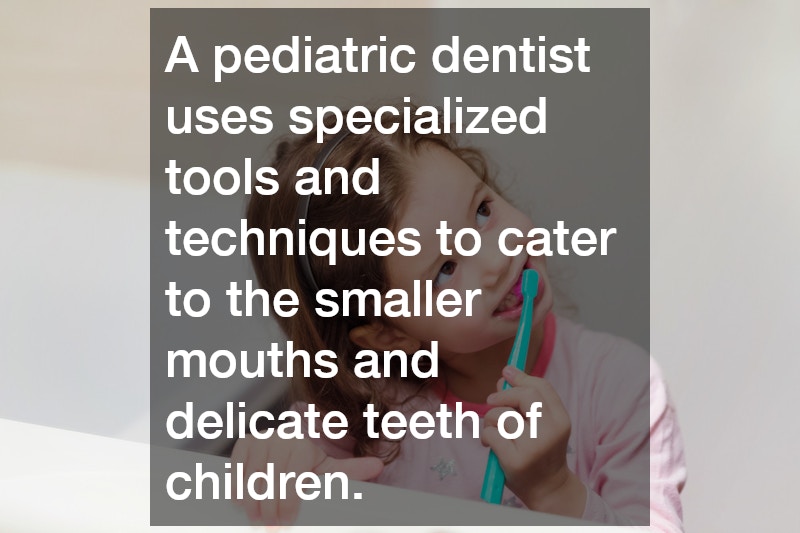Visiting the dentist can be an intimidating experience for adults and children alike. However, understanding what happens during a pediatric dental appointment can ease worries and prepare both parents and kids for what to expect. This comprehensive guide will walk you through the different stages of a pediatric dental appointment, offering insights into what makes these visits both unique and essential for your child’s oral health.
The Importance of Pediatric Dentists
Pediatric dentists specialize in oral health care for children, offering expertise in managing anxiety and unique dental needs. They are trained to handle the fears and behavioral complexities often encountered when treating young patients.
Their offices are typically designed with a child-friendly approach, making visits enjoyable and stress-free.
A pediatric dentist uses specialized tools and techniques to cater to the smaller mouths and delicate teeth of children. Unlike general dentists, they have extensive training in child psychology, which helps in managing dental anxiety. Their focus is not just on treatment but also on educating parents and children about preventive care and oral hygiene.
Choosing the right pediatric dentist is crucial, as they play a significant role in instilling good dental habits from an early age. A comfortable and reassuring environment can make a big difference in how children perceive dental care. Early positive interactions with pediatric dentists can lay the foundation for a lifetime of healthy dental habits.
Initial Consultation and Examination
The first step of a pediatric dental appointment is the initial consultation and examination. It begins with a review of your child’s medical history and any concerns you may have about their oral health. This is an opportunity for parents and children to ask questions and learn what to expect during the visit.
During the examination, the pediatric dentist will gently inspect your child’s teeth, gums, and overall oral hygiene. They will look for signs of decay, gum issues, or developmental concerns. If necessary, X-rays may be taken to get a closer look at the teeth’s development and spot issues not visible to the naked eye.
Parents and children should not feel rushed during this time, as building trust is crucial in establishing a positive dentist-patient relationship. The pediatric dentist will explain each step, using child-friendly language to minimize fear and anxiety. This stage is essential in diagnosing any immediate issues and planning future dental care.
Cleaning and Preventive Care Measures
Once the examination is complete, the next step involves teeth cleaning and preventive care. Professional cleanings are essential for removing plaque and tartar that regular brushing cannot eliminate. The pediatric dentist will carefully clean and polish the teeth, making them look and feel fresh.
During the cleaning, children will be introduced to proper brushing and flossing techniques. Pediatric dentists place a strong emphasis on educating children about good oral hygiene practices. This is reinforced through demonstrations and hands-on practice to empower kids to take control of their dental health.
Sealants and fluoride treatments may also be recommended as preventive measures to protect against cavities. These treatments are quick, painless, and highly effective in maintaining dental health. By prioritizing these preventive measures, pediatric dentists aim to reduce the risk of future dental problems.
Addressing Dental Anxiety in Children
A notable feature of pediatric dental appointments is the emphasis on managing and reducing dental anxiety in children. Pediatric dentists employ various strategies to create a calming and welcoming environment. From playful decor to gentle communication, every aspect is geared towards alleviating fears.
Techniques such as “tell-show-do” allow dentists to explain procedures using simple language and actions before performing them. By doing so, children know what to expect and are less likely to feel anxious. Distraction tools such as cartoons or music can also be used to keep children relaxed and entertained during their visit.
Parental involvement plays a significant role in easing anxiety as well. Pediatric dentists encourage parents to stay with their children during appointments to provide comfort and support. Establishing a familiar and trusted presence helps children feel secure, turning dental visits into positive experiences.
Setting the Stage for Future Dental Health
Beyond addressing immediate dental needs, pediatric dental appointments set the stage for lifelong oral health. By instilling good oral care habits early on, children learn the importance of regular brushing, flossing, and professional check-ups. Pediatric dentists aim to empower children with the knowledge and skills needed to care for their teeth.
Parents are educated on the best practices for supporting their child’s dental health at home. Recommendations on diet, fluoride use, and habits such as thumb sucking are provided to prevent future dental issues. With guidance from a pediatric dentist, parents can reinforce good practices and monitor their child’s oral health development.
Continued visits to a pediatric dentist foster a healthy attitude towards oral care, reducing the likelihood of dental anxiety in the future. As children grow older, these positive experiences influence their views on dental health, making them more likely to maintain regular dental routines. The ultimate goal is to equip children with the confidence and habits that promote a healthy smile for life.
In conclusion, a pediatric dental appointment is much more than just a check-up or cleaning. It is an opportunity to ensure your child’s dental health is on the right track while educating them about the importance of oral hygiene. By understanding what to expect during these visits, parents can support their children in developing lifelong dental health habits, setting the stage for healthy smiles well into adulthood.



